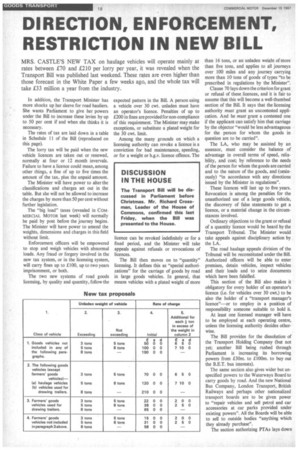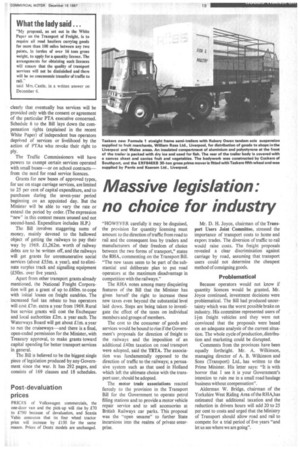DIRECTION, ENFORCEMENT, RESTRICTION IN NEW BILL
Page 20

Page 21

If you've noticed an error in this article please click here to report it so we can fix it.
MRS. CASTLE'S NEW TAX on haulage vehicles will operate mainly at rates between £70 and £210 per lorry per year, it was revealed when the Transport Bill was published last weekend. These rates are even higher than those forecast in the White Paper a few weeks ago, and the whole tax will take £33 million a year from the industry.
In addition, the Transport Minister has more shocks up her sleeve for road hauliers. She wants Parliament to give her powers under the Bill to increase these levies by up to 50 per cent if and when she thinks it is necessary.
The rates of tax are laid down in a table in Schedule 11 of the Bill (reproduced on this page).
The lorry tax will be paid when the new vehicle licences are taken out or renewed, normally at four or 12 month invervals. Failure to have a licence could mean, among other things, a fine of up to five times the amount of the tax, plus the unpaid amount.
The Minister will have power to alter the classifications and charges set out in the table. But she will not be allowed to increase the charges by more than 50 per cent without further legislation.
The "big load" taxes (revealed in COMMERCIAL MOTOR last week) will normally be paid by post before the journey begins. The Minister will have power to amend the weights, dimensions and charges in this field without limit.
Enforcement officers will be empowered to stop and weigh vehicles with abnormal loads. Any fraud or forgery involved in the new tax system, or in the licensing system, will carry fines up to £100, up to two years imprisonment, or both.
The two new systems of road goods licensing, by quality and quantity, follow the expected pattern in the Bill. A person using a vehicle over 30 cwt. unladen must have an operator's licence. Penalties of up to £200 in fines are provided for non-compliance of this requirement. The Minister may make exceptions, or substitute a plated weight for the 30 cwt. limit.
Among the many grounds on which a licensing authority can revoke a licence is a conviction for bad maintenance, speeding, or for a weight or h.g.v. licence offence. The licence can be revoked indefinitely or for a fixed period, and the Minister will take appeals against refusals or revocations of licences.
The Bill then moves on to "quantity" licensing. It defines this as "special authorizations" for the carriage of goods by road in large goods vehicles. In general, that means vehicles with a plated weight of more than 16 tons, or an unladen weight of more than five tons, and applies to all journeys over 100 miles and any journey carrying more than 10 tons of goods of types "to be prescribed in regulations by the Minister".
Clause 70 lays down the criterion for grant or refusal of these licences, and it is fair to assume that this will become a well-thumbed section of the Bill. It says that the licensing authority must grant an uncontested application. And he must grant a contested one if the applicant can satisfy him that carriage by the objector "would be less advantageous for the person for whom the goods in question are to be carried".
The LA, who may be assisted by an assessor, must consider the balance of advantage in overall terms of speed, reliability, and cost; by reference to the needs of the person for whom the goods are carried and to the nature of the goods, and (ominously) "in accordance with any directions issued by the Minister in regulations".
These licences will last up to five years. Revocation is among the penalties for the unauthorized use of a large goods vehicle, the discovery of false statements to get a licence, or a material change in the circumstances involved.
Ordinary objections to the grant or refusal of a quantity licence would be heard by the Transport Tribunal. The Minister would take appeals against disciplinary action by the LA.
The road haulage appeals division of the Tribunal will be reconstituted under the Bill. Authorized officers will be able to enter premises, detain vehicles, inspect vehicles and their loads and to seize documents which have been falsified.
This section of the Bill also makes it obligatory for every holder of an operator's licence (i.e. for vehicles over 30 cwt.) to be also the holder of a "transport manager's licence"—or to employ in a position of responsibility someone suitable to hold it.
At least one licensed manager will have to be employed at each operating centre, unless the licensing authority decides otherwise.
The Bill provides for the dissolution of the Transport Holding Company (but not yet; another Bill being rushed through Parliament is increasing its borrowing powers from £30m. to f100m. to buy out the B.E.T. bus interests).
The same section also gives wider but unspecified powers to the Waterways Board to carry goods by road. And the new National Bus Company, London Transport, British Railways and perhaps other nationalized transport boards are to be given power to "repair vehicles and sell petrol and car accessories at car parks provided under existing powers". All the Boards will be able to sell to outside bodies "anything which they already purchase".
The section authorizing PTAs lays down
clearly that eventually bus services will be provided only with the consent or agreement of the particular PTA executive concerned. Schedule 6 to the Bill lays down the compensation rights (explained in the recent White Paper) of independent bus operators deprived of services or livelihood by the action of PTAs who revoke their right to Ply
The Traffic Commissioners will have powers to exempt certain services operated with small buses—or on school contracts— from the need for road service licences.
Grants for new buses of approved types, for use on stage carriage services, are limited to 25 per cent of capital expenditure, and to purchases during the seven-year period beginning on an appointed day. But the Minister will be able to vary the rate or extend the period by order. (The expression "new" in this context means unused and not second-hand. Expenditure includes H.P)
The Bill involves staggering sums of money, mainly devoted to the hallowed object of getting the railways to pay their way by 1969. £1,262m. worth of railway debts are to be written off, and the railways will get grants for unremunerative social services (about £55m. a year), and to eliminate surplus track and signalling equipment (£50m. over five years).
Apart from other transport grants already mentioned, the National Freight Corporation will get a grant of up to £60m. to cope with initial losses on freight sundries. The increased fuel tax rebate to bus operators will cost £7m. extra a year from 1969. Rural bus service grants will cost the Exchequer and local authorities £2m. a year each. The Waterways Board will get about £ lm. a year to run the cruiseways—and there is a final, open-ended permission for the Minister, with Treasury approval, to make grants toward capital spending for better transport services in general.
The Bill is believed to be the biggest single piece of legislation produced by any Government since the war. It has 292 pages, and consists of 169 clauses and 18 schedules.
Post-devaluation prices
PRICES of Volkswagen commercials, the one-door van and the pick-up will rise by £70 to £790 because of devaluation, and Scania Vabis announce that its four wheel tractor price will increase by £150 for the same reason. Prices of Deutz models are unchanged.












































































































